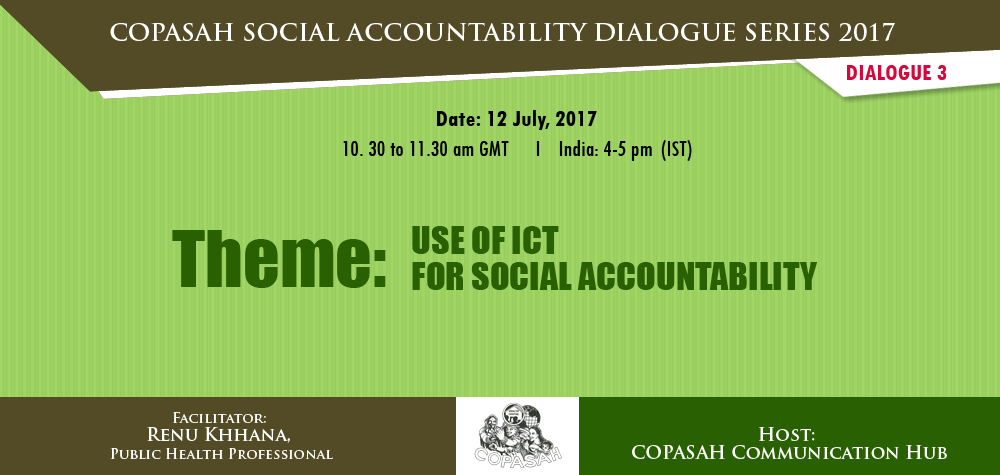
|
|
|
Introduction: In the series of its Social Accountability Dialogue (COPSAD), COPASAH held its third Dialogue on July 12, 2017 from 10.30 am- 12.00 GMT, 4.00 pm to 5.30 pm IST on the theme Use of ICT for Social Accountability. COPASAH started the series of Social Accountability Dialogues in March this year and this initiative aims to facilitate mutual learning among practitioners and accountability thinkers across the globe as well to enrich the field of social accountability with insights and experiences from the field of accountability practice. In the third dialogue noted health rights activist and one of the founding members of COPASAH currently also Steering Committee member of COPASAH, RenuKhanna shared the experiences from the COPASAH initiative carried in India where community leaders and community members collectively used ICTs to generate evidence as well used it to negotiate for denial of health rights.
|
SOCIAL ACCOUNTABILITY DIALOGUE, PART 1
|
|
Discussion and Presentation: In the Dialogue, supported by a presentation, RenuKhanna began the session by outlining the fundamentals ofaccountability, social accountability and relation to participation, ICT for social accountability. She then delved into showcasing the Use of ICT for social accountability of COPASAHinitiative pursued through community leaders and community members(who had experience of being involved in community monitoring), across six different locations of India. She outlined how after technical trainings on photo-voices and videos, accessible technology such as basic cameras, mobile cameras were used to bridge divides to facilitate quicker and efficient communication for meeting the community health needs and for prioritizing in health planning through two examples of case stories from Karnataka and Gujarat. She reflected what she called cascading model as how community leaders and community members/ CBO members produced negotiated for health rights using multiple ways of photo-video documented along with report cards as evidence on issues that of maternal health and nutrition, functioning of health centers and denial of health rights of manual scavengers respectively.
|
SOCIAL ACCOUNTABILITY DIALOGUE, PART 2
|
She further highlighted that the process helped in reframing ‘what is evidence and the teams from the states reported value addition to their community monitoring efforts as the photo-video documentation came forth for them as powerful visual evidence both for community awareness and mobilization and for advocacy also. Empowerment of community volunteers – handling technology, editing, creating stories around photos and creating exhibitions, witnessing effects of advocacy through photo voice and others come forward. The experiment helped in creating new forms of ‘voice’ and participation as technology came to be used by marginalized affected groups and supported them in creating their own visual evidence to highlight issues and use it for advocacy.
Following the presentation, a short film was showcased highlighting the ICT initiative of COPASAH.
Comments, Questions and Participation:The Dialogue witnessed participation of nearly 22 persons from different geographical locations of India and Uganda. To make the dialogue a participatory one, questions, comments and insights were also sought from the participants. The participants sought many queries from the presenter and also shared their experiences of social accountability practice from the field. A participant shared experience of piloting a social accountability intervention in the state of Bihar. It was also highlighted by the participant that there is often a disconnect between what is implemented by social accountability practitioners and what service providers perceive it to be. It was mooted that at the provider level it is very clear that they have the power and are the decision makers so breaking this power make-up is challenging task and it was queried that how can service providers be involved in the process of social accountability and the disconnect be removed.There was a larger agreement in the discussion by the participants that a continuous engagement, mobilization and commitment is required insocial accountability and is a long process of empowerment. A participant also queried as how can the private sector be held accountable for not following practice guidelines and SOPs. Another participant was keen on knowing the ethics and the guidelines followed in the ICT process.
Following the presentation, a short film was showcased highlighting the ICT initiative of COPASAH.
Comments, Questions and Participation:The Dialogue witnessed participation of nearly 22 persons from different geographical locations of India and Uganda. To make the dialogue a participatory one, questions, comments and insights were also sought from the participants. The participants sought many queries from the presenter and also shared their experiences of social accountability practice from the field. A participant shared experience of piloting a social accountability intervention in the state of Bihar. It was also highlighted by the participant that there is often a disconnect between what is implemented by social accountability practitioners and what service providers perceive it to be. It was mooted that at the provider level it is very clear that they have the power and are the decision makers so breaking this power make-up is challenging task and it was queried that how can service providers be involved in the process of social accountability and the disconnect be removed.There was a larger agreement in the discussion by the participants that a continuous engagement, mobilization and commitment is required insocial accountability and is a long process of empowerment. A participant also queried as how can the private sector be held accountable for not following practice guidelines and SOPs. Another participant was keen on knowing the ethics and the guidelines followed in the ICT process.

